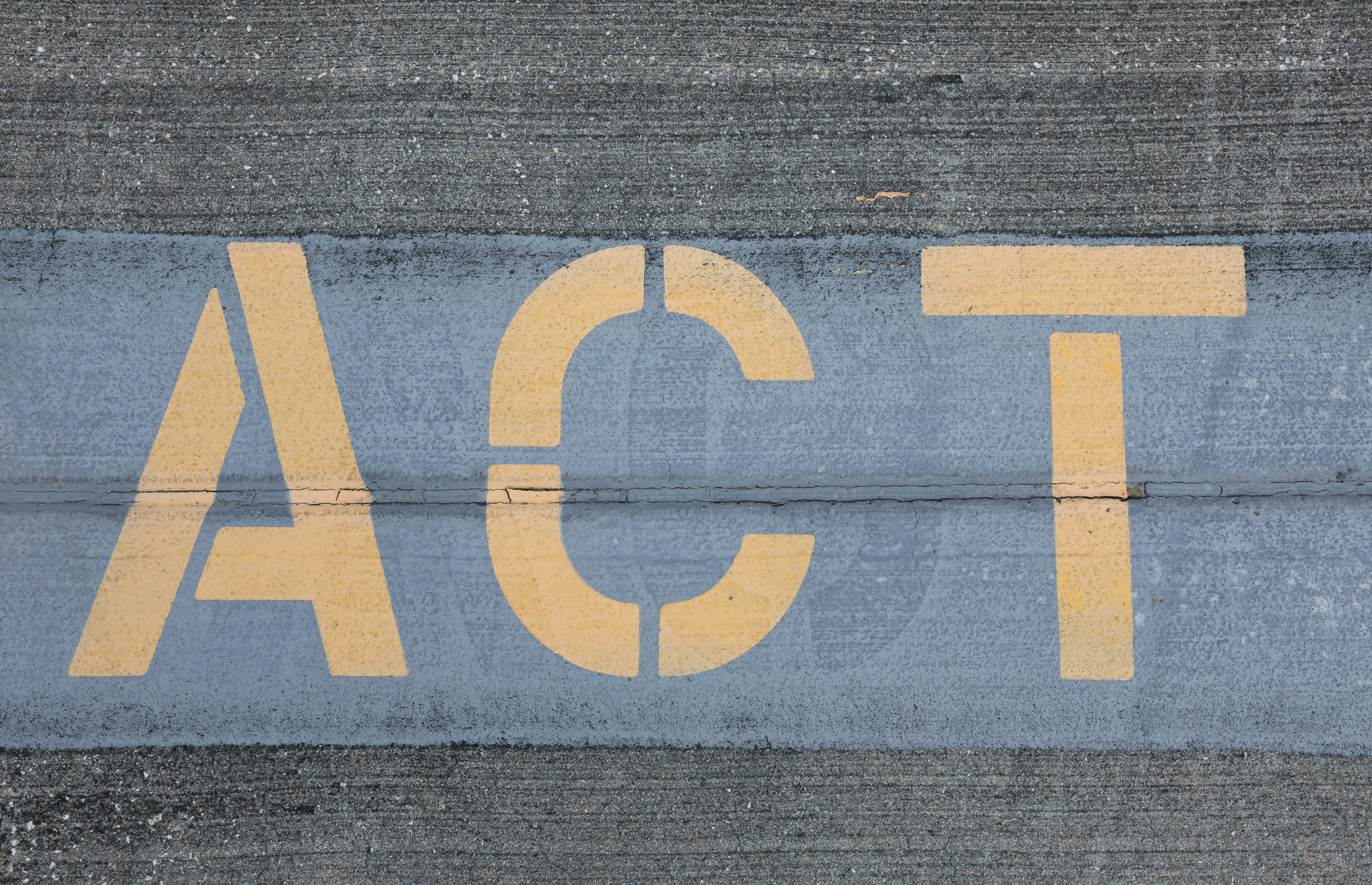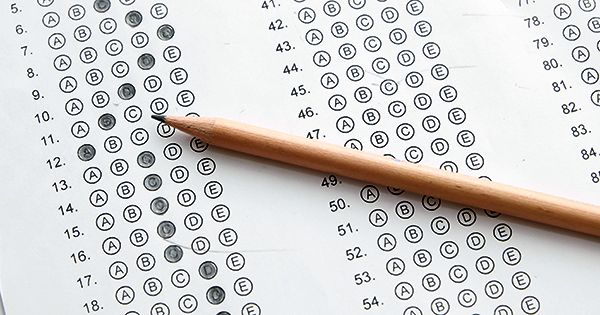
ACT: Everything You Need to Know
The ACT is one of two standardized tests used in college admissions. The makers of ACT are rolling out updates to the test in 2025 and 2026.

This blog was originally published on April 13, 2023. It has been updated with the most recent information.
*Please note: This guide reflects the Enhanced ACT format rolling out nationwide in 2025–26. If ACT announces further changes, we’ll update this page again.
What is the ACT?
The ACT is one of two standardized tests that is commonly used for college admissions (with the SAT serving as an alternative). While some schools have recently waived the test as a requirement, the ACT remains one of the primary pieces of evidence that colleges use to determine which students are accepted. For this reason, a high score can open up many options to a high schooler that they may not otherwise receive, including admissions and scholarships. This test is fairly rigorous, and an understanding of what it covers and its structure are instrumental in receiving the score you want. This guide will serve as an overview of the test and will give you some of the tips required to succeed.

Why is the ACT important?
The ACT is one of the few ways that colleges are able to directly pit your abilities against those of your peers. Most other measures of your understanding, including GPA, extracurriculars, and essays, are dependent on your school and therefore variable. The ACT provides a single measure of your capacity for various academic skills, and many colleges weigh this heavily when determining which students to accept.
Which Schools in NYC Accept the ACT?
The ACT is broadly accepted by most colleges in the United States. Some examples of colleges in NYC that accept the ACT include New York University, Barnard College, and Queens College.
How long is the ACT test?
As of September 6, 2025 the national exam moved to the new, shorter version of the test for both digital and paper/pencil versions. School districts will be able to offer the shorter version in the Spring of 2026.
Paper and Digital Versions Starting September 2025
| Section | Number of Questions | Minutes |
| English | 50 | 35 |
| Math | 45 | 50 |
| Reading | 36 | 40 |
| Science (Optional) | 40 | 40 |
| Writing (Optional) | 1 | 40 |
How many times can you take the ACT?
You are allowed to take the ACT up to 12 times, but realistically most students take the test between 2-4 times. In general, taking the test more than once is recommended - in addition to building experience, you will also get the ability to superscore, which allows you to take the highest score from each test you took to calculate your composite score. This almost invariably will increase your score even with no net improvement on the score. On the other hand, planning to take the test over and over will have diminishing returns and is generally unnecessary, costing both time and money. Usually, 2-4 times is enough to familiarize yourself with the test and take full advantage of superscoring.
How hard is the ACT?
The ACT can be quite challenging, but with the right study and preparation, students can sit the exam with confidence. One way to organize the challenges is to split them into three categories: content, technique, and attitude. First, to succeed on this test, you must have a solid understanding of all the material on the test: the ACT covers a variety of math topics up to and including precalculus, several grammar rules, and rigorously tests comprehension of both literary and scientific passages. Some math topics covered on the ACT but not the SAT include matrices, imaginary numbers, and number theory.
However, just having the raw skills isn't enough to succeed on the test. Knowing the structure of the test is critical - doing multiple practice tests will provide the practice you need to familiarize yourself with the test and find ways to navigate the stamina and timing issues that the test provides.
Finally, on test day, it is crucial to have the right attitude to put your practice into action; finding the right balance between confidence and seriousness on the test can be a challenge, but will provide significant rewards. Each section provides its own challenges, and putting the entire test together can be an intensive process that requires preparation and practice. Ivy Tutors Network can help develop a personalized plan to find success on this test!
ACT Test Dates
When are the ACT test dates?
The ACT is given a few times a year. The exact dates can be found on their registration site.
ACT Registration
How to sign up for the act?
Signing up for the ACT is a relatively straightforward process. After creating a login for the ACT, you will be prompted to choose which test date you would like to sign up for and be able to view available locations. Regular registration for a test date closes a month before the test, and late registration (with an extra fee) closes two weeks before the test, so plan ahead to make sure that you are able to take your test on the planned date. You can sign up for the ACT at this link.
How much does it cost to take the ACT?
The base registration fee is $68. The science portion is now optional and costs $4. In addition, the essay writing portion costs $25. The ACT does provide fee waivers for low income students - if you apply and receive one of these, you can take the ACT and send score reports to colleges for free. To apply, speak to your high school counselor to determine if you are eligible. More information about eligibility can be found here.
How to cancel the ACT?
If you have already signed up for the ACT, but can't attend your test, you do not need to take any actions. The ACT is nonrefundable, so you would unfortunately forfeit your registration fee.
Generally, there aren't many good reasons to do this - even if you got a poor score, most colleges do not require you to submit every score you have. The only reasons to cancel an ACT score are if you know that certain scores are significantly worse than your normal score AND a college you're applying to requires you to submit all of your scores, or if you have requested a score to be sent to a certain college before looking at the score. If you're sure that you want to cancel your score, you can cancel your ACT score by contacting the ACT directly.
When you do this, the ACT will provide you with the forms necessary to cancel or delete your scores.
ACT Test Structure
What is on the ACT?
There are currently two versions of the test, a paper ACT and a digital ACT. Both have the same format. The English, Math and Reading sections are required. Science and Writing is optional. These changes happened starting September 2025.
How many questions are on the ACT?
As of September 2025, both the digital and paper versions have 131 required questions (English, math, and reading) and the optional science has 40 additional questions.
Regardless of which version you’re taking, practice tests are the easiest way to familiarize yourself with the test's structure and feel confident on test day.
ACT Sections
ACT English
The English section is made up of 6 passages, with 5 to 10 questions per passage for a total of 50 questions to be completed in 35 minutes. This section is made up of 2 main types of questions: grammar questions in which you replace the underlined portion to correct the sentence, and interpretation questions in which you determine where and if a sentence should be placed in the passage to achieve a specified goal.
Learn more about ACT English tips in our article.
ACT Math
The Math section is a set of 45 questions on varying math topics up to the precalculus level to be completed in 50 minutes. These questions start easy, but get more challenging as you go. The topics vary from question to question, so be sure to be comfortable with a wide variety of math topics before attempting the test.
To learn more about ACT Math tips read our article.
ACT Reading
The reading section is made up of 4 passages with 9 questions on each for a total of 36 questions to be completed in 40 minutes . They have questions that test interpretation of the passage and the ability to make inferences.
Find our more ACT Reading tips in our article.
ACT Science
The ACT Science section includes 7 passages (depending on the test). These can cover biology, chemistry, physics, earth science, and environmental science. This section focuses on testing skills such as data interpretation, the ability to draw conclusions, and a general understanding of the scientific process.
To learn more about ACT Science read our article.
ACT Writing
The Writing section is an optional section that is scored separately from the rest of the test. This 40 minute section involves writing an essay comparing multiple perspectives on a topic. Before signing up for this, be sure to check if the colleges you are applying to consider this section - many colleges don't.
ACT Test Day Rules
What to bring to the ACT?
You should bring your photo ID, your admission ticket, several #2 pencils, your ACT approved calculator, a watch or other timing device (without alarms set) and a snack for the break. For more information from the ACT, check out this link.
What calculators are allowed on the ACT?
Any 4 function or graphing calculator is allowed so long as it does not have a Computer Algebra System (CAS). For more information about ACT calculators, check out this link. The digital ACT now has a similar Desmos calculator built in similar to that on the SAT.

When do ACT scores come out?
ACT scores typically come out within 6 weeks of the test date, but this can vary depending on the test. Generally, the latest it is possible to take the test is December of your senior year, but it's a good idea to take it earlier to give yourself space to take it multiple times and allow room for error.. Plan ahead!
How to get ACT scores?
Your ACT score will be posted on the ACT website. Use the same login that you used to register for the test.
What is the average ACT score?
The average ACT score is between 19 and 20. That said, each college has its own standards, and the median scores per college are posted online. Be sure to look at the colleges you're interested in applying to for more accurate measures of the scores you should be aiming for.
How to Study for The ACT: 10 Tips
1. Start Early
The ACT is a rigorous test, and will require diligent and consistent practice from even the most accomplished students. Start looking into the test well before you take it to succeed. Ivy Tutors Network suggests that ACT students start with them 12 weeks before the test to provide time to review all content necessary and practice with full length tests. Every student is different and you may need more or less time to study and fully understand the test, so don't wait to start practicing to see where you are and what you will need to do to achieve your desired score.
2. Know the test
At a base, understanding exactly what is on the test is crucial. Make sure, at minimum, you know the grammar rules required for the english section, the math skills and concepts required for the math section, and are able to read and interpret both literary and scientific passages.for reading and science. Until you feel comfortable with these topics, stop here. There is very little point to studying the structure of the test until you have the prerequisite skills to handle the test. After this point, these tips will assume that you have the background to tackle these questions individually. Ivy Tutors Network is happy to help develop a personalized plan for you to get the knowledge you need with the help of our expert tutors.
For more information as to what topics are covered on the test, check out this guide from the official ACT.
3. Treat time as a resource
Initially, the test will seem to be very fast - each section gives at most 1 minute per question, with many sections providing less. As you practice, however, you will find that not every question will require the full amount of time allotted. This is deliberate, and it is essential to your success that you take less time whenever possible so that when questions require multiple minutes, you have saved time up until that point. When practicing timed drills, give yourself *slightly* less time than the test gives you, to allow for variance on the test.
4. Practice like it's the real thing
The ACT is a 4 hour timed test, and it's important to be at your 100% throughout the entire thing. The only way to prepare for this is to practice on full length ACT tests. By doing several full length tests, your body will learn how to handle the stress of a long timed test, and you will also automatically learn techniques to decrease fatigue as you go through. Many mistakes that are on the test are caused by either nervousness or fatigue, so practicing diligently with full length tests can help build the stamina you need. Ivy Tutors Network can administer practice ACT tests for you at home or at our test center. Click here to sign up for a diagnostic.
5. English: the shortest answer tends to be correct
From this point, I will provide 1 tip per section that I believe is the most critical piece of information to succeed on each section. The english section tests grammar, and pretty strongly adheres to a rule of good writing: if something can be said in fewer words and present the same meaning, it should; in other words, there should always be a reason if you want to use more words instead of fewer. The shortest answer rule will not only solve redundancy and awkwardness questions, but will also solve passive vs active voice, certain uses of pronouns, and questions which test multiple concepts at once. That said, this rule is not 100% - you must have a good understanding of grammar rules before applying this. With this qualification in mind, choosing the shortest answer is a great guessing strategy if required, and can help you pick an answer quickly before justifying why it must be correct.
6. Math: do the first half fast
I have already talked about timing, but the math section in particular requires a smart allocation of time per question. In the math section, the test gets harder as you go further. Once near the end, questions can require more than a minute, so it is essential that you save that time earlier on. I recommend aiming to get to question 30 by minute 23 - this provides enough impetus to speed through the early sections while still allowing for high accuracy there. By doing this, you will find that even if a question near the end of the test takes longer, you will have the time to tackle it.
7. Reading: answer the question before looking at the choices
In the reading section, it is useful to think of the passage as 3 sections: the passage itself, the questions, and the answer choices. Out of these three, the answer choices are the only ones that are not designed to help you succeed; in fact, three out of the four answer choices are intended to catch misinterpretations of the passage itself. If you try to use the answer choices to answer the questions, you will often be influenced by these misinterpretations and this would lead to the right answer. Instead, read the question and try to come up with an answer in your head first - this will allow you to draw conclusions from the passage itself, where the real answers lie. If you can't come up with an entire answer, that's ok - just starting the thought process before looking at the choices can improve accuracy immensely.
8. Science: keep moving
The ACT science has the objectively easiest questions, but the time pressure and punishing curve can make this have the most variable score. Keep in mind it does not count towards your total score. The time pressure here looks similar to reading (35 minutes for 40 questions), but because it has 7 passages instead of the 4 passages of reading, it is much tighter. For this reason, it's important to not plan to double back or spend extra time on a question. Once you're sure of an answer, move on and don't go back. This will allow you to finish the test consistently, which is one of the hardest parts of this section.
9. Have the right attitude
Nerves are a real factor on this test, and you have to be able to maintain a confident but not cocky attitude on test day. Nervousness is fine and can even help keep attention up over the 4 hour test, but it's important to continue to believe in your abilities and not let doubt set in. By keeping this serious but self assured attitude, you will be able to use your critical thinking skills to their maximum capacity, minimizing your mistakes and answering questions which you ordinarily would not be able to.
10. Take the test multiple times
After getting your score back, plan to take the test again, even if you have achieved your desired score. Many colleges superscore, which means that they will take your highest scores from each test and use those to compile your strongest composite score. Even if your overall score does not increase from one test to the next, your superscore may increase significantly due to variance. For this reason, I'd recommend taking the test at least twice once you have achieved the level of mastery you want.
Preparing for the ACT can be overwhelming, so it's totally natural to feel like you don't know where to start studying. If you find yourself in this position, Ivy Tutors Network is here to guide you. We will pair you up with an experienced ACT tutor who can help you create a personalized study plan. We will provide materials and expert tips to attain both the prerequisite skills and the mindset necessary to reach your target score!




